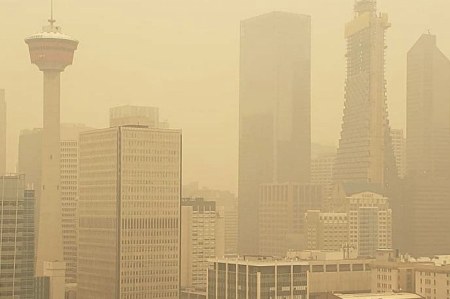As I look outside, I see what can only be described as an apocalyptic view of the city. The smoke that has landed in Calgary the last few days from the wildfires in northern Alberta negatively affect the cardiovascular and respiratory health of everyone, especially children and the elderly. Less discussed, however, are the psychological affects of air pollution. According to the American Psychological Association “researchers have found that high levels of air pollution may damage children’s cognitive abilities, increase adults’ risk of cognitive decline and possibly even contribute to depression.”
https://www.apa.org/monitor/2012/07-08/smog
These studies tell us what we already intuitively know; during times of low air quality our mood changes, our ability to focus declines and our mind becomes “foggy”. Fortunately these levels of low air quality are typically short lived in Calgary and overall we are blessed with clean air and a healthy environment. Alberta Health Services have provided the following precautions to reduce exposure during low air quality alerts:
If air quality is because of smoke reduce presence of smoke in indoor environments:
- Close and lock all outside windows and doors, including attached garage doors.
- Turn down furnace thermostats and furnace fans to the minimum setting. Do not attempt to extinguish pilot light.
- If you have an air-conditioner, keep the fresh-air intake closed and the filter clean to prevent outdoor smoke from getting inside.
- Avoid running fans, such as “whole-house fans” or “fresh air ventilation systems”, that bring more smoky outdoor air inside.
- Switch all floor registers to closed position.
- Close fire place dampers on wood burning fireplaces.
- Do not use wood burning fireplace, wood stoves or other smoke-producing appliances or features, including candles.
- If you must drive to another location, keep windows and vents closed. Run car fans on re-circulate mode to avoid drawing in outdoor air.
- Reduce levels of physical activity, as necessary, to decrease the inhalation of airborne pollutants.
- Do not smoke tobacco – smoking puts added stress on your lungs and those around you.
- Residents are reminded not to use backyard fire pits or fire boxes in parks when the air quality risk is high or very high, as it is now.
Individuals with respiratory conditions (such as COPD and asthma), and individuals with existing cardiovascular conditions (such as angina, previous heart attack and congestive heart failure), may notice a worsening of symptoms, due to the poor air quality conditions. These individuals should monitor for worsening of symptoms and take the precautions routinely recommended by their physicians if a worsening of symptoms occurs.

